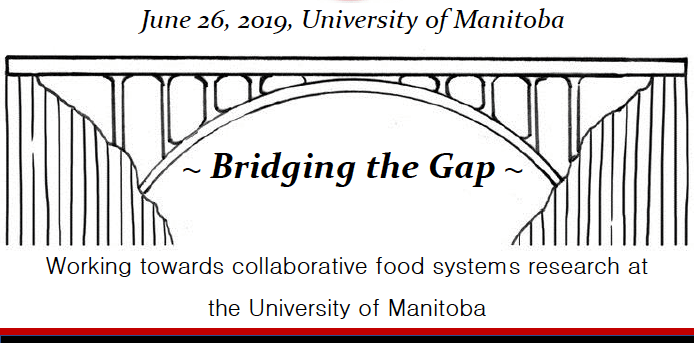
Second UofM Food Systems Student Symposium set to “Bridge the Gap”
Register today for the University-wide F3S – Food Systems Student Symposium taking place June 26th. Students! There is still time to submit your abstract and qualify for an award…but not much (deadline May 24).
Planning committee members and Masters students Hannah Bihun and Roxie Koohgoli promoted F3S 2019 at a recent Food Systems Research Group seminar.
WHAT ARE FOOD SYSTEMS
When it’s time to eat, most of us don’t think about all the logistics and relationships required to deliver the dish placed in front of you. On average, food commodities travel between 1500 to 2500 miles before reaching their final destination – the plate. This journey of food creates what is known as the food system. A food system, as defined by the Oxford Martin Programme, includes “activities involved in the production, processing, transport, consumption, sustainability, governance and economics of food production, as well as the degree to which we waste food, and how food production affects the natural environment including health and wellbeing.”
The escalation of globalization over the past few decades has changed the way the food system works. Before the expansive growth of worldwide markets and the interconnectedness of economies, the majority of the food was raised and distributed locally. Today the journey from raw product to the food on your plate commonly involves several countries.
“Food systems are incredibly complex, operating on local, national and international scales, and they continue to grow in intricacy,” began Hannah and Roxie. “And they can contribute to social, political, economic, environmental, scientific, and health challenges.”
“Finding solutions to these problems requires collaboration across various governmental and non-governmental sectors to drive vibrant economies to have strong relationships around food. Collaboration leads to resilient networks necessary for rebuilding a healthy food system. Coming together with the common interest of food, collaborative research will allow the resources from each group forming the interconnectedness of food systems to make a greater impact in solving the flaws of the global food system.”
A key point that Hannah and Roxie emphasized was that society already has all the necessary resources needed to support healthy food systems without the detrimental effects that are currently being caused. By working with multiple stakeholders, which include, but are not limited to, agricultural producers, educators, policymakers, food inventory managers and community organizers, a sustainable and efficient food system can be developed.
F3S 2019
The F3S planning committee sees the Food Systems Student Symposium as pivotal to not only bridge the knowledge gap of food systems on campus, but between government, civil society and industry as well. This years’ theme for the 1-day event, ‘Bridging the Gap,’ will focus on facilitating meaningful discussions and collaborations on food systems research across Faculties on campus. The symposium provides an opportunity for graduate and undergraduate students at the University of Manitoba to present their research with a new perspective. While all collaborative research fosters innovation through the exchange of resources and expertise between stakeholders, it is especially essential within the realm of academia as each faculty approaches problems differently, whether it be a top-down or a bottom-up approach.
Keynote speaker Dr. Tara Moreau will kick off the day-long event. Dr. Moreau is a professor at the University of British Columbia with extensive experience relating to food systems. She is a member of the Vancouver Food Policy Council, has worked internationally as a consultant with the UN-Food and Agriculture Organization and is a board member at SPEC, a Vancouver-based environmental NGO. Graduate students conducting research on foods systems will present and discuss their findings through a combination of oral and poster presentations. The afternoon will feature a panel discussion with members of the Food Systems Research Group who will speak to how they are Bridging the Gap in their food systems-related research.
While most of the 118 attendees last year were graduate students, there were also undergraduate students and industry members in attendance, with a total of 9 faculties being represented. The F3S planning committee is working hard to attract undergraduate students to attend this year’s symposium in hopes that the discourse and presentations on food systems will spark an interest to continue their studies, pursuing a Masters or PhD.
ATTEND THIS YEARS FOOD SYSTEM STUDENT SYMPOSIUM
This year’s F3S will be held on Wednesday, June 26th, 2019 in 200 Robson Hall at The University of Manitoba from 8:30 am- 4:30 pm with a social to follow.
Registration is open to both University of Manitoba students ($25) and staff ($50) as well as the public ($50). Registration and more information can be found online at https://uomfssc.com/registration/
Call for student abstracts: Students! Submit your abstract online: https://uomfssc.com.
- The deadline for student speaker competition abstracts is Friday, May 24th at 4:00pm
- The deadline for student poster competition abstracts is Friday, May 31st at 4:00pm
What is the Food Systems Research Group? The FSRG is an umbrella group fostering the creation of multi/trans-disciplinary collaborative research to advance the theme of Safe, Healthy, Just and Sustainable Food Systems.
Sign up to receive FSRG news by sending an email to foodsystems [at] umanitoba [dot] ca.
Sara Poppel is an economics student currently helping with communications with the Food Systems Research Group.






